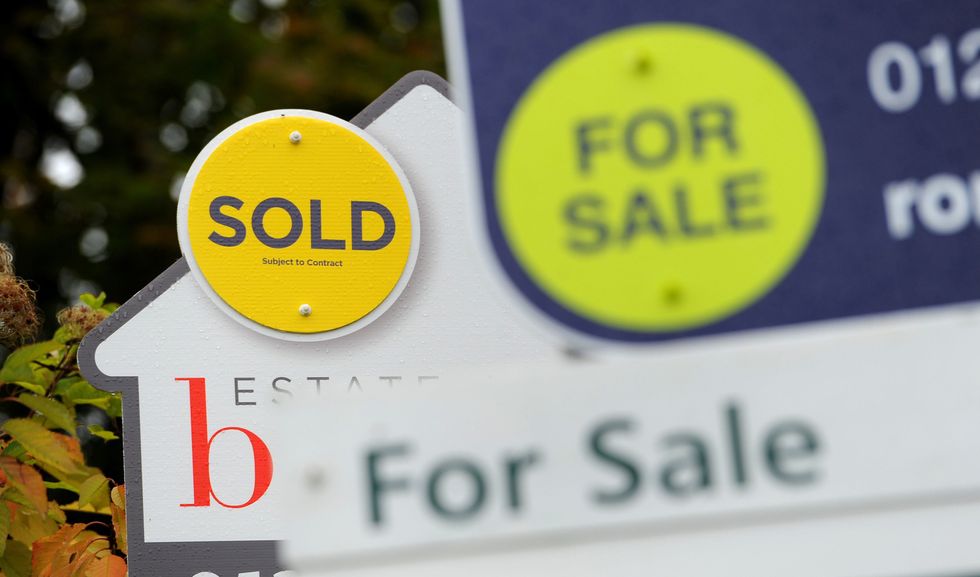UK inflation has fallen to the lowest level in two years sparking homeowners to wonder what it could mean for mortgage rates
GETTY
UK inflation has fallen to the lowest level in two years, according to official data published today
Don't Miss
Most Read
Trending on GB News
The rate of inflation in the UK has fallen sharply to 4.6 per cent in the year to October, down from 6.7 per cent the month before.
It has dropped to the lowest level in two years, with the slowdown coming after energy prices soared last year.
With the Bank of England having now paused increasing the base rate for two months in a row after 14 consecutive hikes, the new inflation figures may leave many homeowners and buyers wondering when mortgage rates will go down.
Alice Haine, Personal Finance Analyst at Bestinvest, said falling inflation delivers “fresh hope” to mortgage holders and prospective buyers, who will be hoping for interest rate cuts to “soften the blow” from high mortgage rates.
WATCH NOW: Liam Halligan reacts to falling inflation
However, Ms Haine suggested the base rate is not likely to drop in the near future. She said: “For now, a headline rate of 5.25 per cent is likely to remain the status quo as the Bank of England endeavours to ensure inflation continues to ease in the coming months.”
However, there could be good news for those with a mortgage. She said: “The improving inflation outlook will add fuel to improving market interest rate expectations, which are already feeding through to the mortgage market.
“The number of mortgage products available is creeping up, with the options for those with lower deposits of five per cent or 10 per cent at their highest level since before the mini-Budget last year, according to Moneyfacts, while average rates are continuing to retreat from their summer highs.
“This bodes well for new buyers looking to get a foot on the property ladder, who may find the combination of easing house prices, positive wage growth and improving mortgage rates improves the affordability crunch and makes it easier to secure a mortgage.”
However, existing homeowners may be feeling less upbeat.
Ms Haine said: “Yes, improving rates will feel like a relief from the outlandish interest rate expectations seen earlier in the year, but those emerging from a cheap fixed rate deal taken out before the BoE’s tightening cycle began in December 2021, are now shopping for a fresh product in a very expensive market.
“The reality is that household budgets must now absorb significantly higher monthly mortgage repayments, so unless homeowners have used savings to overpay and reduce their outstanding balance, the switch to a new product is going to hurt.”
She added: "Those locked into longer-term deals, not set to expire until 2025 or 2026, will also be on tenterhooks, watching nervously to see when the BoE starts to cut interest rates.”
Amanda Aumonier, the Director of Mortgage Operations at Better.co.uk said a fall in inflation would typically prompt the Bank of England to look at cutting interest rates, but it isn’t expected immediately.
She said: “Industry experts are anticipating that the current base rate is unlikely to change in the next year, suggesting that mortgage interest rates are likely to stabilise for the time being.
“Having said that, it's crucial to bear in mind that geopolitical uncertainties could impact the economy, so making precise predictions about what interest rates are going to do is always a gamble.
LATEST DEVELOPMENTS:

First-time buyers are being reminded that the 'perfect moment will never exist'
PA
“If you're thinking about buying your first home and wondering if now is the right time, remember that the perfect moment will never exist. The important thing is to avoid making decisions that could put you under financial strain.”
Many homeowners may now be wondering whether to find a new fixed-rate mortgage or look at a variable or tracker rate.
Ms Aumonier said: “If your fixed deal is coming to an end within the next six months, talk to a mortgage broker who can provide you with personalised guidance based on your current financial stability and how comfortable you are with taking risks.
“Choosing a fixed-rate mortgage is a smart move if you like knowing exactly how much you'll pay each month and want to stick to a tight budget.
“But if you're okay with a bit of uncertainty and think interest rates might go down, a variable or tracker mortgage could save you money over time.”








